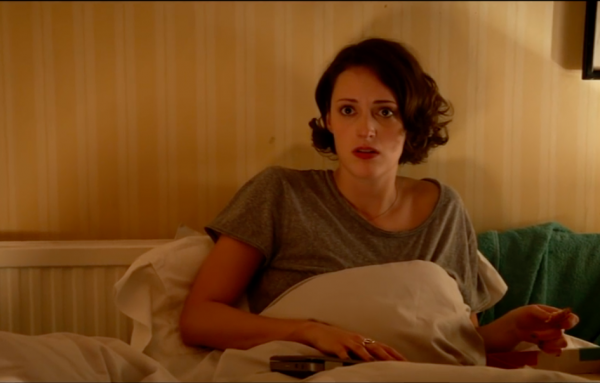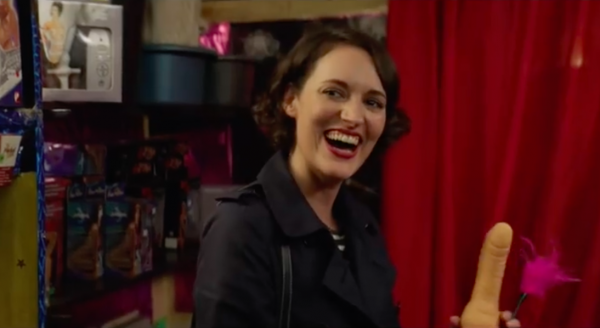If I simply described the premise of Fleabag, you’d probably feel like it’s not going to work. That has less to do with the show itself and more to do with every American TV show you’ve seen try to do it before now.
Fleabag is not American, even though it’s an Amazon “original series.” It’s British, and thank God for that.
We’ll get to the reasons why in a bit, but first let’s discuss the plot. Phoebe Waller-Bridge plays Fleabag (she is never referred to by her given name, so we’re left with that apt description), a self-loathing woman who goes through life like a tornado of self-destruction, depravity, and sexual conquest. There is no act of gratification off limits, no low she will not sink to, and no line she will not cross in order to… get what she wants? To be honest, what she wants doesn’t even seem to be clear, certainly not to herself.
As she puts it when she shows up at her father’s doorstep at two in the morning, sloshed out of her head, “I have a horrible feeling that I’m a greedy, perverted, selfish, apathetic, cynical, depraved, morally bankrupt woman who can’t even call herself a feminist.” Her emotionally-distant father calmly replies, “You get all that from your mother.”
That’s the plot, but wait until I tell you about the way the show works. Fleabag is constantly shifting between the world she lives in and breaking the fourth wall to talk directly to the audience. I mean constantly. She’ll say something to her sister, then say something to us, then say something else to her sister, and then give us a look off of her sister’s response.
It’s the kind of trick that could spell disaster in a lesser show. In fact, it has. But Waller-Bridge sells the hell out of the conceit and makes it feel almost necessary. It’s not a cheap way to move the plot forward; it’s a legitimate discussion that she’s having with us. If you’re bothered by it at first, you soon forget to be bothered and eventually find yourself appreciating the storytelling device. In a world in which she drives everyone away, we, the audience, are the only people left for Fleabag to truly connect with.
The six-episode series picks up after Fleabag’s best friend and business partner has accidentally committed suicide (it’ll make sense when you see it, kinda), leaving her to run their failing bakery. Strapped for cash, she tries to turn to her terrified-of-life sister (Sian Clifford) for help, but can’t pull the trigger. She certainly can’t get help from her gutless father (Bill Paterson), who is married to Fleabag’s godmother, a self-involved artist played by Olivia Colman. All the while, she bounces between an on-again/off-again boyfriend, an out of her league friend-with-benefits, and a charming doofus she meets-cute on a bus. And all the while, she torpedoes her relationship with all of them.
Fleabag is not for the squeamish or for the delicate. Anal sex, vibrators, and lewd jokes abound. It is as raunchy as just about any comedy you’ll find on TV today. But what separates this series from its counterparts, many of which are American versions of the “bad girl” premise, is the the unflinching ability of Waller-Bridge and the show to remain 100 percent unapologetic for anything and everything Fleabag does. While the fact that she is female is a major focus of the story, that she is female does not define her depraved actions.
We’ve seen countless male versions of this character. The perverted man-child who takes out his pain on everyone else. Television is littered with shows about that guy. But there have been so few attempts to provide a truly distilled version of that character as a woman.
There have been attempts in recent years on American television, but the truth is, no one has pulled the trigger and gone all the way. Shows like You’re The Worst and Crazy Ex-Girlfriend make valiant efforts, but they don’t quite peel back everything and show up the gory, human truth. Unlike Amy Schumer, this isn’t saying and doing raunchy things as the joke. Fleabag says and does raunchy things because it’s innately her. It doesn’t feel commented on. American shock comedy often relies on telling. Fleabag shows. And I think it takes an English sensibility to make that happen.
Fleabag isn’t always a downer, mind you. It’s extremely funny and often, somehow, insightful. There’s a lot of work being done beneath the surface involving men and women living in a post-feminist world and what roles both of them are supposed to play. No one is safe from a skewering but that also means all sides get explored and conjure up some interesting conclusions. It doesn’t hurt that the supporting cast featuring Brett Gelman, Hugh Dennis, and Jenny Rainsford do such a great job giving life to those characters who end up having such an impact on Fleabag.
You may not come away from the first series (as there will undoubtedly be a second) of the show liking Phoebe Waller-Bridge’s character but you’ll likely come away understanding her. The full explanation of why she is the way that she is might even bleed over into your own life. That’s the highest compliment the show can be paid. For as big and dark and shocking as the show and the character can be, she never stops feeling like an actual human being. Like one of us.

